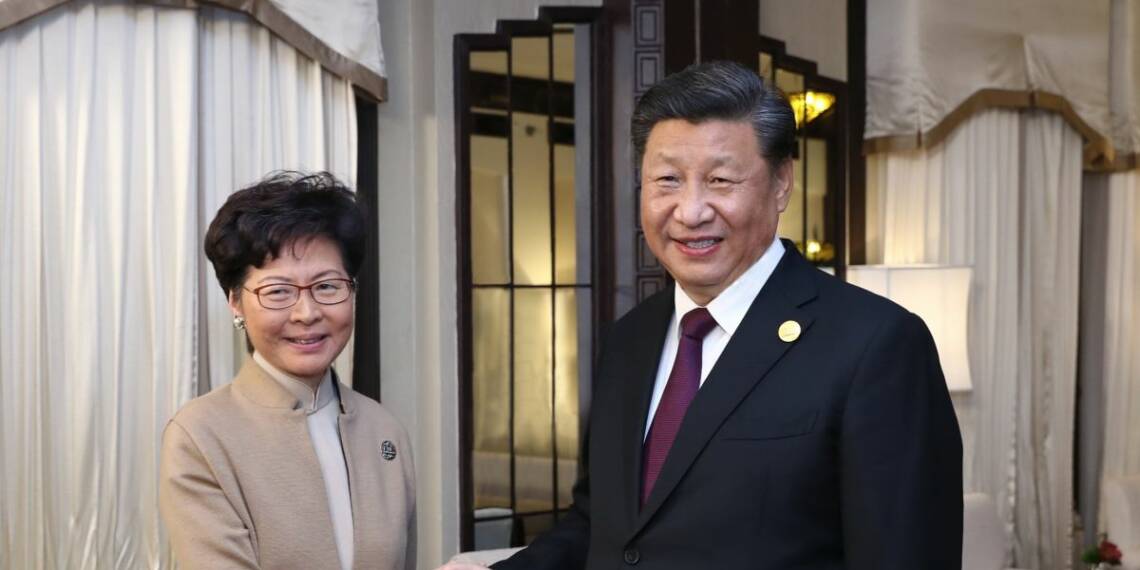Almost one and a half years after China started to take over Hong Kong in March 2019, with the introduction of the extradition bill, the city is reeling under economic slowdown. Since March 2019, there have been continuous protests in the city against forceful Chinese takeover, and this resulted in disruption in the economic activities.
In 2020, the economy was further hit by the Coronavirus pandemic and the introduction of National Security Law- which practically ended its status as an autonomous city. With the end of autonomy, the city lost its status as a global financial centre because the foreign players no longer have the freedom to do business in Hong Kong as they are operating under the oppressive regime of Chinese Communist Party.
Hong Kong’s leader Carrie Lam is now visiting Beijing to seek economic aid from the Communist government in order to bring the city’s economy on track. She will also discuss how Hong Kong can best ‘cooperate’ with Shenzhen, the neighbouring city which CCP is projecting as an alternative to the former.
Previously, Lam postponed her annual policy address and promised that support from Beijing, for which she is visiting, will boost the confidence in Hong Kong’s economic future. However, given the fact Beijing already wants Shenzhen to replace Hong Kong, any support from CCP is very unlikely. In fact, the city of Hong Kong is now a burden for Beijing and it would want to end its status as a financial hub as soon as possible.

Hong Kong has not witnessed a single quarter of economic expansion since July last year when the Chinese crackdown on the city’s autonomy intensified. Despite the fact, China grew at a healthy rate, the city of Hong Kong is mired in recession since the last one and a half years. The contraction grew at an exponential rate with 2.8 per cent in the third quarter of last year to 3 per cent in the last quarter. In the ongoing year, the contraction was 9.1 per cent in the first quarter, 9 per cent in the second quarter, and 3.4 per cent in the third quarter.

This, compared to the economic growth of China whose GDP contracted only for a single quarter, shows that the Chinese Communist Party is deliberately destroying the economic future of the city of Hong Kong. CCP is promoting Shenzhen and Shanghai as the financial hub of the country and Hong Kong has become a burden for the Communists.
Now, the only hope for Lam is favourable policies from the newly elected Biden administration because American investors play the most important role in the city’s status as a financial hub. Donald Trump’s tough stance on Hong Kong, after China ended the autonomy of the city, led to massive disruption in the city’s financial infrastructure and Biden is a ray of hope for Lam.
“I hope that the new U.S. administration will handle relations with Hong Kong in a comprehensive way, taking into account the interests of the many U.S. businesses in Hong Kong that employ a lot of people, and will not thoughtlessly allow political considerations to have an unwarranted effect on Hong Kong,” she said.
Lam herself is responsible for the destruction of the city as a global financial centre because had she taken a tough stance against CCP instead of complete submission to Xi Jinping, the city’s economic future would have been secure just like that of Taiwan, and Lam would not have to visit Beijing with a begging bowl.
Any help from CCP is improbable, and the future of Hong Kong is doomed with its human resources already leaving for other countries like Taiwan, Australia, the United Kingdom, and the United States. In the last one and a half years, a city that was the financial capital of Asia is destroyed to ashes, thanks to Lam.








